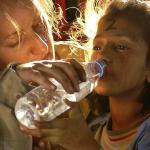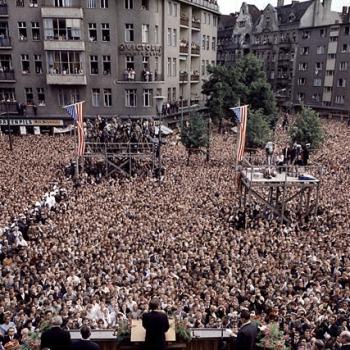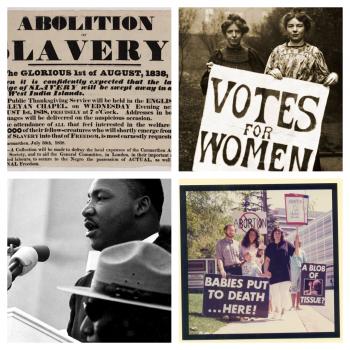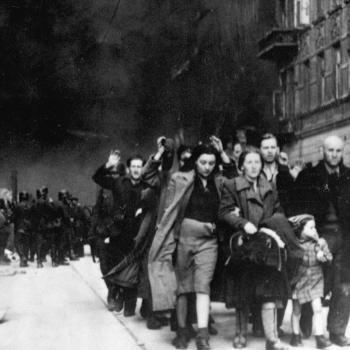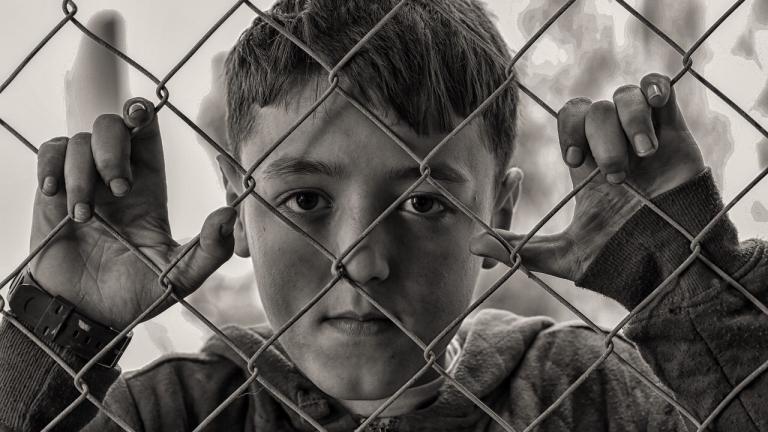
Yesterday my very excellent fellow Patheos blogger Mary Pezzulo asks: What Must a Christian Do For the Helpless?. Her answer is that we must “conform ourselves to Christ” and what he would do. When we see the helpless, we must live in imitation of Christ; the imitation of Christ is not just for when we are feeling pious at adoration. Still less is it for when we take to our blogs and defend, neither Christ nor the helpless, but ourselves. Christ never, Mary points out, blamed the helpless for being helpless. “I do not condemn you,” Christ said to the woman caught in adultery who was in danger of being stoned to death. Though one might say this woman brought it all upon herself, Christ did not. We are to imitate Christ.
Then today, Mary writes about the sheep and the goats. How we treat the desperate—and just as importantly, how we speak of the desperate—is how we treat and speak of Christ. Mary makes the excellent point (I had not thought of it before) that Christ’s words about the sheep and the goats is not a parable. It’s a prophecy. It will happen; God will judge us by how we treat those who are hungry and thirsty and strangers and in prison and desperate in whatever way. It’s very serious.
Both posts are very good and you should read them. Mary is, whether she’d call herself this or not, one of the best Catholic apologists I know.
•••
Now, all this comes up because some people are attempting to explain why the father who recently drowned with his daughter trying to cross the Rio Grande was negligent. Such people (they include Catholics and self-styled career apologists) say the father is to blame. Such folks will deny they lack compassion. But Alt! they will say. A little girl is dead. I say this because I do have compassion for her life. The father was irresponsible!
Of course, what this “But Alt!” crowd fails to mention is that the father is dead too. Where is the compassion for him? But no: What really is behind this is judgment upon a desperate father in the guise of compassion for the daughter.
Some among this But Alt! crowd float in their swimming pools and muse upon the book of Proverbs. This is the kind of life that migrant father could hardly have imagined. What he did imagine was escaping an utter hell and giving something better to his little girl. He was desperate, and he was turned away at a crossing station.
When people are desperate, they are willing to take risks they might not take when they can just float around in their pools all day and chant the wisdom of Solomon. Fr. Angel Sotelo explains why this poor migrant father may have felt that crossing the Rio Grande was a risk worth taking.
That people have crossed the Rio Grande, with their children and have made it to the other side means that there are odds in one’s favor. So, there is some defensible hope, that they can do it.
More to the point, when the human heart is desperate and without hope, a man should not be impeached with culpability, with the assumption that he was in a rational state of mind.
Others have done this, and therefore the father may have thought he could risk it and succeed. And he was desperate. At one time, Charles Ingalls crossed a raging river with his daughters. But he was a pioneer! He was a pull-yourself-up-by-your-bootstraps American! No one says he was a negligent father. But the Ingallses were poor and desperate, and Charles took risks because of it. The only difference is, Charles and his family did not die, and there were no stupid blogs then.
•••
A few years ago, a story made the rounds of social media about a desperate woman who stole five eggs to feed her children. Now, a blogging apologist might say, “You know, she goes to jail and leaves her kids without a mom altogether. Such a negligent parent!”
But the cop did not see it that way. Instead of arresting the woman, he brought her two truckloads of food.
That’s imitating Christ. It’s “I was hungry and you gave me food”; not, “I was hungry and you said I should have budgeted my money better and not stolen those eggs.”
It’s “I was a stranger and you welcomed me”; not, “I was a stranger and you told me the country’s full.”
It’s “I was in prison and you visited me”; not, “I was in prison and you said I should not have broken the law.”
We’re supposed to be Christians. We don’t ask, when someone is in need of our help, what bad things they did to bring all this on themselves. We help them. We love them. We show them mercy. God’s their judge, not us.


